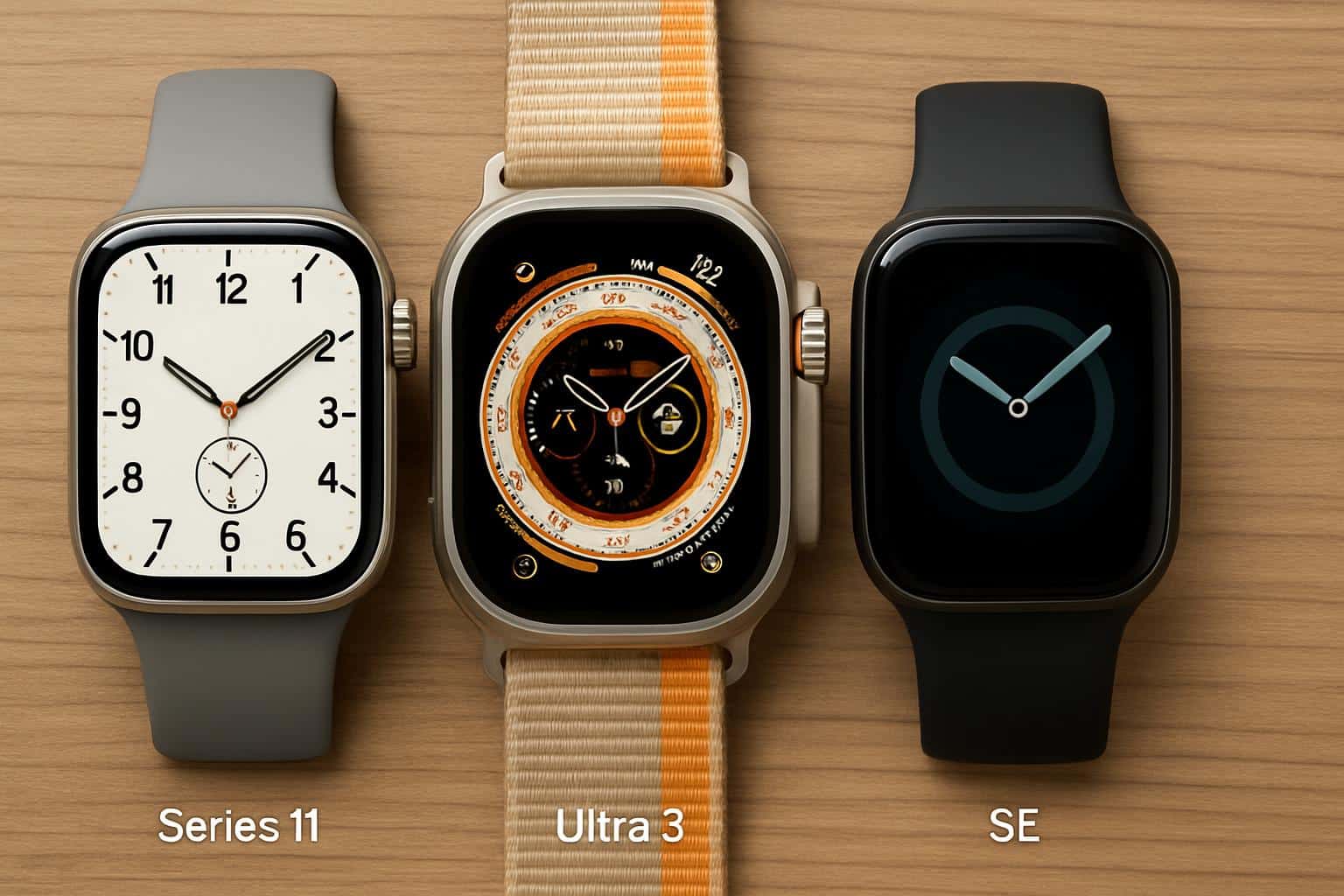I got to spend a little time with the Apple Watch Series 11, Watch Ultra 3, and the new SE soon after the keynote’s applause had finished. On a table, they seem like incremental changes; on the wrist, some lack of sound and fury that the stage did not play up is everything. Here’s what happened off camera.
Series 11: Small tweaks, large daily improvements
Series 11 is thinner than newer models, and that counts for more than you’d imagine. A slimmer profile makes it easier to sleep in, less likely to get caught under cuffs, and more comfortable on smaller wrists. The Digital Crown feels slightly tighter on resistance, which I appreciated when scrolling precisely in workouts.
Battery life finally clears the “one full day” bar without requiring constant baby-sitting of the charger, and Apple says you’ll get about six hours more than the 10 Series. In my brief demo, topping off for 15 minutes moved the needle just enough for the evening — Apple’s claim of roughly eight hours from that quick charge seemed plausible, given what the meter indicated.
The silent hero is the new Sleep Score. It translates duration, consistency and interruptions into an at-a-glance grade, and applies retroactively back to watchOS 26 on Series 6 and newer. It’s not medical sleep staging — Stanford sleep researchers have gone to some effort to point out that consumer wearables are most useful for duration and regularity — but as a coaching resource, Series 11 makes the data digestible and actionable.
Ultra 3: Off grid safety begins
Ultra 3 is still the adventure pick, though what’s new this year is not only a bigger screen and brighter face, but also communication when you are miles from a cell tower. •With built‑in satellite connectivity, friends can activate SOS, check your location, and exchange messages with your contacts at home. In a controlled demonstration, initial link-up only took seconds once I had keyed the watch in the direction of the sky, and message sends were suitably zippy for a trip into a satellite stratosphere.
Battery life is the best in the family: get up to 42 hours between charges, and a 15‑minute quick hit can score around half a day. With 5G cellular onboard for when you’re in range, map updates and music streaming felt distinctly faster than on the last generation. For hikers, backcountry skiers and offshore paddlers, it is the safety net that you hope you will never need — one that search-and-rescue teams say can shave precious time off of emergency response.
SE 3: Value play without looking cheap
The SE, this new one, is the one most people are gonna actually buy. With the S10 chip and the Always-On display added to the mix it definitely does not feel like a cheap device. Fast charging is finally here, and for all of that the same watchOS 26 features and sleep scores included, you have the day-to-day experience most people actually care about in a more reasonable package.
There’s one major exclusion: the Possible Hypertension feature doesn’t make it to the SE. If you’re eyeing the SE for a teenager or family member, that’s good to know along with fall detection and crash detection, which continue to be table stakes across the line.
Health features the keynote skimmed
Possible Hypertension is no portable blood pressure monitor. The watch relies on optical heart sensing to make an analysis of pulse wave trends over 30 days and signal readings that are associated with increased risk of high blood pressure. Apple does have a log, and you can export it as a PDF to share with your clinician. It’s compatible with Series 9 and above and Ultra 2 and above and is seeking approval from the F.D.A.

Cardiology groups like the American Heart Association are no less clear: wrist-worn optical readings are not a substitute for cuff-based measurements. Consider Possible Hypertension a nudge to check with a real monitor, not a diagnosis. That distinction is especially important if you are planning to do something with the data.
On sleep, the new points assigns scoring makes it easier to parse charts. It emphasizes regularity — something sleep labs, such as one at Stanford Medicine, say has an outsize effect on daytime alertness and metabolic health. The absolute simplicity of the score is the point: It gives you a trend to act on, not a medical label to stress over.
Charging and endurance: Real use
Apple’s fast-charge promises were in line with my brief tests but battery life diminishes considerably with sustained GPS, cellular streaming and third‑party workout apps. On the Ultra 3 network, satellite use is meant for brief hits; keep it at that level if you’d like that 42‑hour ceiling to stay in place. The slimmer case on Series 11 did not run hot when fast-charging, which is good news for Late-Night Top-Ups O’Clock.
For context, market researchers CounterPoint Research say Apple drives an outsized proportion of smartwatch revenue worldwide, and it’s notable the company’s focus on battery and health-coaching—the two features most associated with retention in longitudinal user studies.
Buying advice: Shop by lifestyle, not specs
Choose Series 11 if you want the “just works” Apple Watch and better all‑day stamina, the new Sleep Score, and a slimmer case that disappears on the wrist. Most people go with it by default.
Choose Ultra 3 if you’re off the grid on weekends or just need the biggest screen, wildest speaker and longest battery life. Support for satellite and 5G take it from rugged to resilient.
Get SE 3 for core fitness, sleep tracking and Apple‑level safety at the best price. You’ll lose Possible Hypertension, but there won’t be much else you miss on a day-to-day basis.
The keynote slickly narrated the tale. And reports to the wrist are simpler: a smarter battery, clearer health coaching and, on the Ultra 3, a lifeline when it counts. That’s what alters how these watches slot into your everyday life.